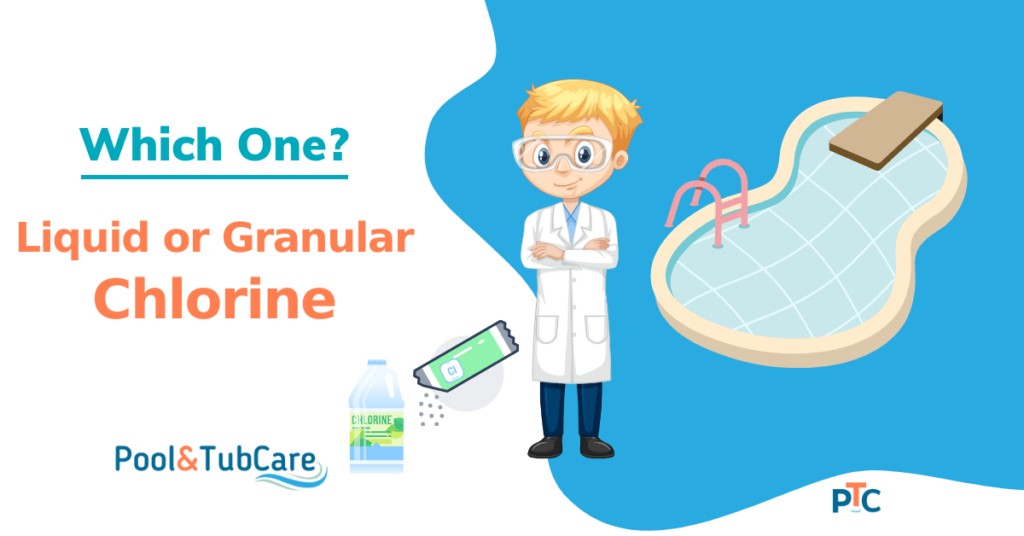Every time you add any chemical to your pool, for calculations, you need to know your pool water volume.
If you haven’t yet figured out the volume of water in your pool, just select the type of pool you have and fill in the measurements in the pool volume calculator below.
Results in the calculator are rounded off to the nearest whole numbers. You don’t have to worry about that, as your pool does not require exact precise calculations like chemistry titrations.
Note: For height measurement, don’t measure wall height. Measure the height of water in your pool from the bottom.
In this article, I will cover how these calculations work. More complex pools need more calculations, which will be explained later.
How to Calculate Pool Water Volume
To get started with calculating pool water volume, you first need to measure pool dimensions. basically you need pool surface area and pool depth.
For that you need to know following metrics.
- Length (L)
- Width (W)
- Depth (D, Shallow and Deep)
- Diameter (d)
- Radius (r)
Multiplying Length (L) with Width (W) will give you the surface area of the pool. Then multiply area with depth and you will get the volume calculations.
The volume you get will be in cubic feet volume, and to convert it into gallons, you need to multiply by a value of 7.5.
Let’s find out how these calculations work in different shapes of pools.
Rectangular Pool Volume Calculation
In this case, your pool Width and Length will be easier to calculate, but you need to be sure about the depth. There are two calculation types based on how the bottom of your pool.
Constant Depth
In this cases Length (L) x Width (W) x Depth (D) x 7.5 = Pool Volume (gallons)
For example, if your pool is 15 feet long,10 feet wide, and 5 feet deep, then the pool volume will be
15 x 10 x 5 x 7.5 = 5,625 gallons
Variable Depth
If your pool has variable depths, then you need to average out the depth for final volume calculations. With a gradual slop, the calculation will be different than sudden depth drops.
In case the change in depths is not regular, treat different parts as two different pools and use constant depth formula for individual components, and add both of them for the final volume.
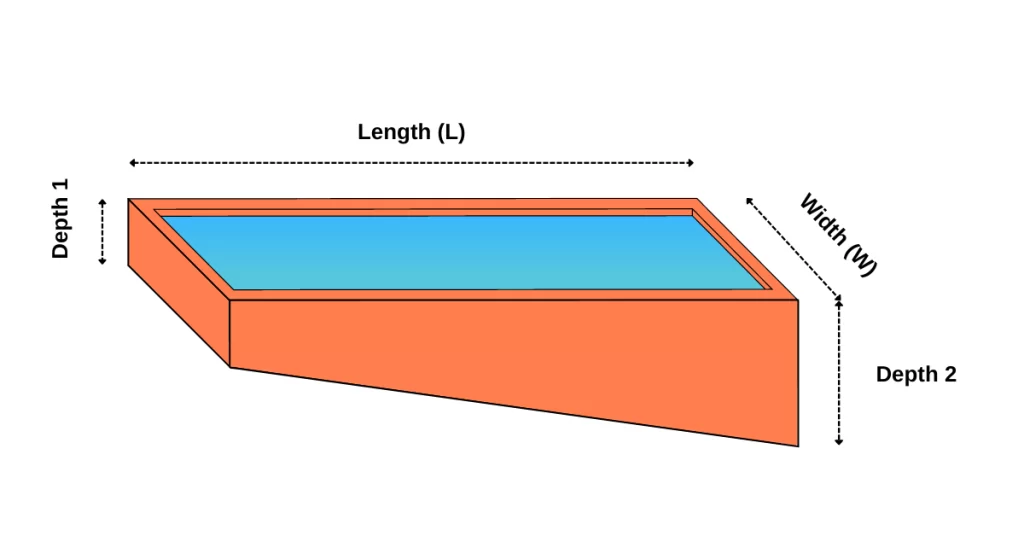
If the slop is gradual, then you can add Deep Depth and Shallow Depth and divide by 2 to get an average depth.
Length (L) x Width (W) x [(Shallow Depth + Deep Depth)/2] x 7.5 = Volume (gallons)
For example, if your pool Length is 15 feet, width is 10 feet, Shallow Depth is 4 feet, and Deep Depth is 8 feet, then pool volume will be
15 x 10 x [(4 + 8)/2] x 7.5 = 6,750 gallons
Round Pool Volume Calculation
To calculate the volume of the round pool, you need to get the values used in the formula
3.14 x Radius Squared (r2) x Average Depth x 7.5 = Volume (gallons)
To find out the radius, measure the pool diameter (your round pool’s widest part) and divide by 2.
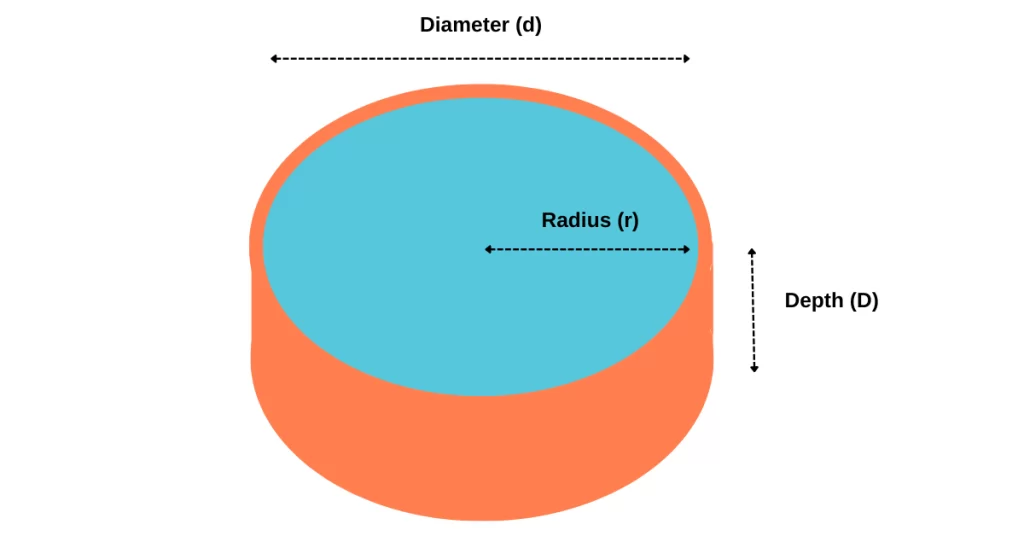
For example, if your pool diameter is 24 feet, its radius will with 12 feet. If the Depth is 5 feet, then the water volume will be
3.14 x (12 x 12) x 5 x 7.5 = 16,956 gallons
If your round pool has variable depth, then you need to calculate average depth by adding Shallow depth and Deep Depth and dividing that by 2.
Oval Pool Volume Calculation
Calculations for an oval pool are almost similar to the rectangular pool by adding one more multiplication.
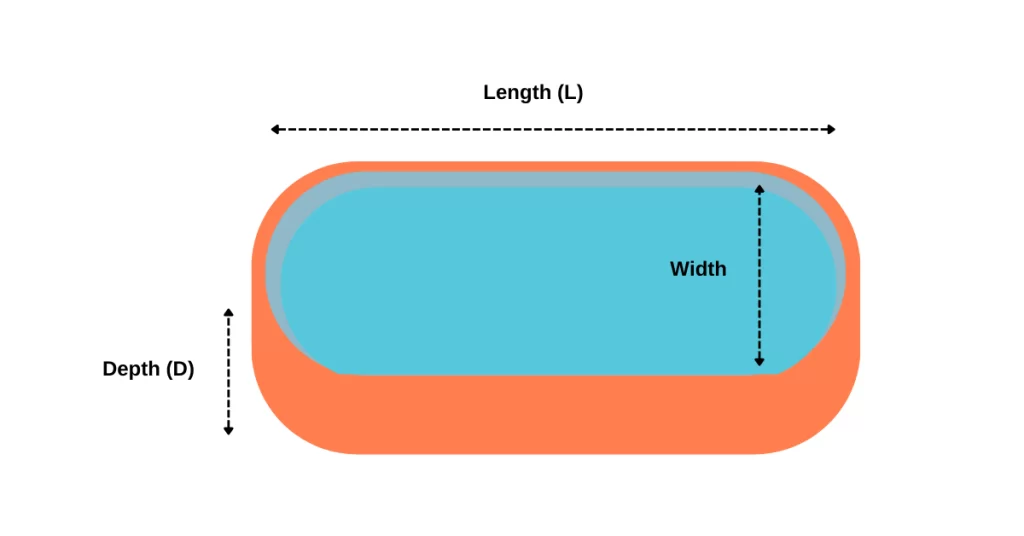
Here is the formula:
π ÷ 4 X Length (L) × Width (W) × Depth (D) × 7.5 = Volume (gallons)
For example, if your pool length is 15 feet, width is 10 feet, and depth is 5 feet then the water volume will be
(3.14/4) x 15 x 10 x 5 x 7.5 = 4,415 gallons
If your pool has variable depths, you need to average them.
Always measure the depth from the water levels and not pool height for example, if your pool height is 5 feet, but it is filled up to 4 feet, then you will overestimate the pool volume by 20% if you use pool height.
This can seriously affect your calculations for chemicals you are going to use in the pool and imbalance pool chemistry.
Kidney-Shaped Pool Volume Calculation
If your pool is kidney shaped, then you will have two variable widths to deal with.
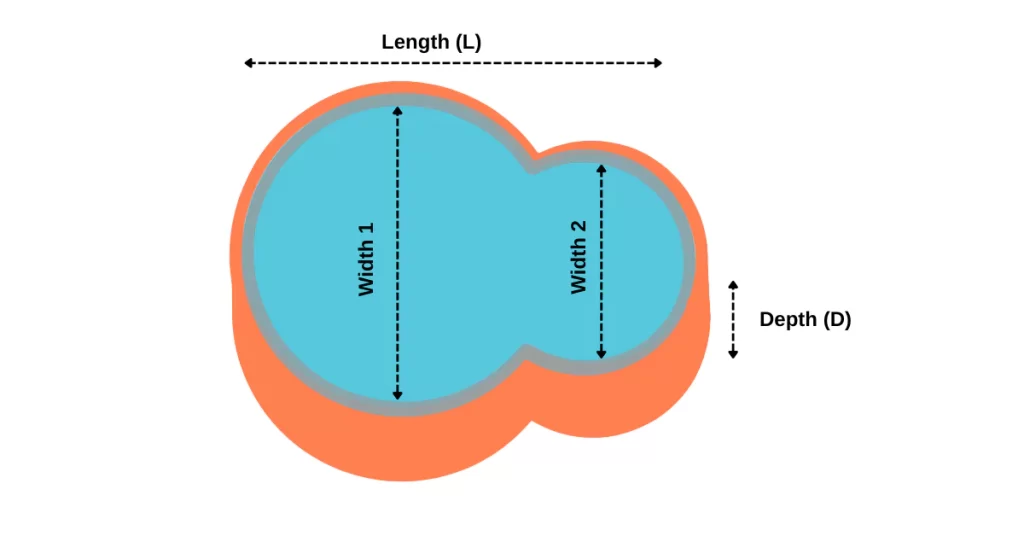
Use this formula to calculate the pool volume water of a kidney-shaped pool.
[(Short Width + Long Width) x 0.45] x Length (L) x Average Depth x 7.5 = Volume (gallons)
For example, if your kidney-shaped pool has short width of 6 feet and long width of 10 feet, a Length of 15 feet, and depth of 5 feet, then volume will be:
[(6 + 10) x 0.45] x 15 x 5 x 7.5 = 4,050 gallons
As in other cases, if the depth is variable, find the average depth by adding two depths and dividing by 2.
Pool Volume Calculations for Variable Pool Shapes
If your pool shape does not fit into any of the above shapes, divide your pool into small pockets that fit any criteria, like round or rectangular.
Then calculate the water volume for each component using formulas or the volume calculator above and, in the end, add all of them to get the final pool water volume.
This way, you will get a near-accurate reading that will be good enough to use for all the calculations.
Standard Pool Volumes
Here are a few standard reference charts that you can have a quick look at.
Above Ground Pools
All calculations assume water depth is less than pool height by 6″.
| Pool Size | 48″ Height | 52″ Height |
|---|---|---|
| 15ft Round | 4,640 gals | 5,080 gals |
| 18ft Round | 6,680 gals | 7,316 gals |
| 20ft Round | 8,245 gals | 9,030 gals |
| 24ft Round | 11,875 gals | 13,000 gals |
| 27ft Round | 15,030 gals | 16,460 gals |
| 30ft Round | 18,555 gals | 20,320 gals |
| 33ft Round | 22,450 gals | 24,590 gals |
| 12x24ft Oval | 5,950 gals | 6,515 gals |
| 15x30ft Oval | 9,290 gals | 10,180 gals |
| 16x32ft Oval | 10,570 gals | 11,580 gals |
| 18x38ft Oval | 14,125 gals | 15,470 gals |
In-Ground Pool
Here depth measurements represent actual water depth.
| Pool Size | 3ft Avg. Depth | 4ft Avg. Depth | 5ft Avg. Depth |
|---|---|---|---|
| 12x24ft Rect | 6,430 gals | 8,640 gals | 10,800 gals |
| 15x30ft Rect | 10,125 gals | 13,500 gals | 16,870 gals |
| 16x32ft Rect | 11,520 gals | 15,360 gals | 19,200 gals |
| 18x38ft Rect | 15,390 gals | 20,520 gals | 25,650 gals |
| 20x40ft Rect | 18,000 gals | 24,000 gals | 30,000 gals |
| 16x32ft Oval | 9,062 gals | 12,080 gals | 15,100 gals |
| 18x38ft Oval | 12,100 gals | 16,140 gals | 20,180 gals |
| 20x40ft Oval | 14,160 gals | 18,880 gals | 23,600 gals |
| 15ft Round | 3,980 gals | 5,300 gals | 6,630 gals |
| 20ft Round | 7,070 gals | 9,425 gals | 11,780 gals |
| 30ft Round | 15,900 gals | 21,200 gals | 26,500 gals |
| 33ft Round | 19,250 gals | 25,660 gals | 32,070 gals |
All Pool Owners Need to Know Their Pool Water Volume
Everyone who manage a pool need to know how much water volume they are dealing with.
You need to know the water volume to calculate how much chemicals you need to add. For installing a pool pump, you need to find out the water volume so that you buy right sized pool pump.
Similarly, when installing pool heaters, you need to know how much water there is that requires heating so that you can install a right sized heater.
If you are still not sure about your pool water volume for any reason, take professional help to find it.




